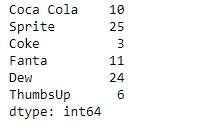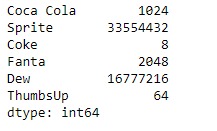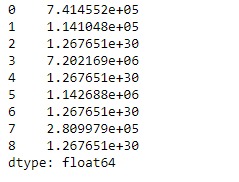Pandas 系列是带有轴标签的一维ndarray。标签不必是唯一的,但必须是可哈希的类型。该对象同时支持基于整数和基于标签的索引,并提供了许多方法来执行涉及索引的操作。
Pandas Series.rpow()函数返回级数和其他元素级的 index 幂(二进制运算符rsub)。相当于other ** series,但支持用fill_value代替输入之一中的丢失数据。
用法: Series.rpow(other, level=None, fill_value=None, axis=0)
参数:
other:序列或标量值
fill_value:填写现有的缺失(NaN)值
level:在一个级别上广播,在传递的MultiIndex级别上匹配索引值
返回:结果:系列
范例1:采用Series.rpow()函数将标量值提高到给定Series对象中每个元素的幂。
# importing pandas as pd
import pandas as pd
# Creating the Series
sr = pd.Series([10, 25, 3, 11, 24, 6])
# Create the Index
index_ = ['Coca Cola', 'Sprite', 'Coke', 'Fanta', 'Dew', 'ThumbsUp']
# set the index
sr.index = index_
# Print the series
print(sr)输出:

现在我们将使用Series.rpow()函数将标量提高到给定系列对象的每个元素的幂。
# raise 2 to the power of each element in
# the sr object
selected_items = sr.rpow(other = 2)
# Print the returned Series object
print(selected_items)输出:

正如我们在输出中看到的,Series.rpow()函数已成功返回序列对象,这是取幂运算的结果。
范例2:采用Series.rpow()函数将标量值提高到给定Series对象中每个元素的幂。
# importing pandas as pd
import pandas as pd
# Creating the Series
sr = pd.Series([19.5, 16.8, None, 22.78, None, 20.124, None, 18.1002, None])
# Print the series
print(sr)输出:

现在我们将使用Series.rpow()函数将标量提高到给定系列对象的每个元素的幂。我们将在所有缺失值的位置替换100。
# raise 2 to the power of each element in
# the sr object
selected_items = sr.rpow(other = 2, fill_value = 100)
# Print the returned Series object
print(selected_items)输出:

正如我们在输出中看到的,Series.rpow()函数已成功返回序列对象,这是取幂运算的结果。
相关用法
- Python pandas.map()用法及代码示例
- Python Pandas Series.str.len()用法及代码示例
- Python Pandas.factorize()用法及代码示例
- Python Pandas TimedeltaIndex.name用法及代码示例
- Python Pandas dataframe.ne()用法及代码示例
- Python Pandas Series.between()用法及代码示例
- Python Pandas DataFrame.where()用法及代码示例
- Python Pandas Series.add()用法及代码示例
- Python Pandas.pivot_table()用法及代码示例
- Python Pandas Series.mod()用法及代码示例
- Python Pandas Dataframe.at[ ]用法及代码示例
- Python Pandas Dataframe.iat[ ]用法及代码示例
- Python Pandas.pivot()用法及代码示例
- Python Pandas dataframe.mul()用法及代码示例
- Python Pandas.melt()用法及代码示例
注:本文由纯净天空筛选整理自Shubham__Ranjan大神的英文原创作品 Python | Pandas Series.rpow()。非经特殊声明,原始代码版权归原作者所有,本译文未经允许或授权,请勿转载或复制。
